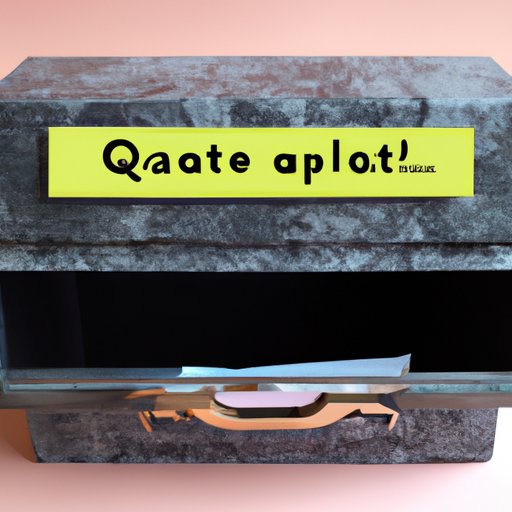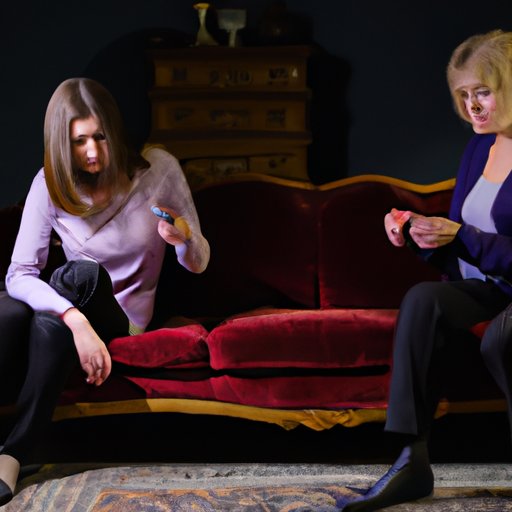Introduction
Have you ever experienced an overwhelming urge to steal something, even if you didn’t need it or want it? For people with kleptomania, stealing becomes a compulsive behavior that they can’t control. It’s not a sign of moral weakness or greediness but a mental health disorder that affects people from all walks of life, regardless of their age, gender, or social status. In this article, we’ll explore what kleptomania is, its causes and symptoms, and how to identify and seek treatment.
Understanding the Mind of a Kleptomaniac: What Causes Compulsive Stealing?
Kleptomania is a type of impulse control disorder that makes people steal things without any apparent reason or motivation, other than the overwhelming impulse they feel. Unlike ordinary stealing, which is done for personal gain or profit, kleptomania is not motivated by financial or material benefits or social pressure. Instead, it’s a coping mechanism that some people use to manage anxiety, depression, or other emotional or psychological pain, albeit temporarily.
Some common symptoms of kleptomania include:
- Feeling a rising tension or arousal before stealing
- Feeling pleasure or relief while stealing
- Feeling guilty, ashamed, or remorseful after stealing
- Difficulty resisting urges to steal, even if aware of the consequences
- Stealing objects that are not valuable, useful, or needed
- Hoarding or giving away stolen objects
Various theories attempt to explain the underlying causes of kleptomania, some of which include:
- Inherited genetic predisposition that affects the brain’s dopamine and serotonin levels, leading to impulsivity and poor decision-making
- Brain abnormalities or circuitry dysfunction in the frontal lobe, amygdala, or striatum, which regulate attention, impulsivity, and reward-seeking behavior
- Unresolved emotional trauma, such as childhood abuse, neglect, or loss, leading to low self-esteem, anxiety, or depression

The Hidden Disorder: Identifying Kleptomania and Seeking Treatment
Kleptomania is often misperceived as a moral or legal issue, rather than a medical one. Many people with kleptomania feel ashamed, guilty, or embarrassed about their behavior, and may try to hide it from others. They may avoid seeking help for fear of being judged, labeled, or punished. However, without proper treatment, the symptoms of kleptomania can worsen and lead to legal problems, job loss, relationship issues, and emotional distress.
Some common misconceptions about kleptomania include:
- Kleptomaniacs are greedy or immoral people who enjoy stealing
- Kleptomaniacs steal only expensive or valuable objects
- Kleptomaniacs can stop stealing if they want to
- Kleptomaniacs belong in jail or prison
Fortunately, there are ways to identify kleptomania and seek appropriate treatment. If you or someone you know is struggling with compulsive stealing, look for the following signs:
- Frequent and unexplained disappearances of objects
- Hoarding of objects that don’t seem necessary or useful
- Difficulty controlling impulses or urges to steal
- Anxiety, depression, or shame related to stealing
- Legal or financial problems related to stealing
If you suspect that you or someone you know has kleptomania, it’s essential to seek professional help. Some effective treatments for kleptomania include:
- Psychotherapy, such as cognitive-behavioral therapy (CBT), which helps identify and change negative thoughts and behaviors related to stealing, and seeks alternative coping mechanisms
- Medication, such as selective serotonin reuptake inhibitors (SSRI), which regulate the brain’s dopamine and serotonin levels, reducing impulsivity and anxiety
- Support groups, such as the Kleptomaniacs Anonymous (KA) or Debtors Anonymous (DA), which provide a safe and non-judgmental environment for sharing experiences, learning coping skills, and offering mutual support
Kleptomania and Society: Debunking Myths and Changing Attitudes
Despite being a recognized mental health disorder, kleptomania is often stigmatized or misunderstood by society. The media, in particular, tends to portray kleptomaniacs as villains, criminals, or comic relief, perpetuating negative stereotypes and hindering empathy and understanding towards those who struggle with compulsive stealing.
To better understand and support people with kleptomania, it’s essential to differentiate between the facts and myths about the disorder. Some common myths about kleptomania include:
- Kleptomania is uncommon or rare
- Kleptomania affects only women or teenagers
- Kleptomaniacs steal only to satisfy material or social needs
- Kleptomania can be cured by punishment or deterrents
Instead, it’s important to recognize that kleptomania exists on a continuum of compulsive behaviors, ranging from mild to severe, and that it can affect anyone, regardless of their demographic or background. People with kleptomania are not weak or immoral, but suffer from a debilitating mental health disorder that deserves compassion, respect, and proper treatment.
From the Inside Out: A Personal Account of Living with Kleptomania
What’s it like to live with kleptomania, day in and day out? Here’s a personal story of someone who has struggled with compulsive stealing:
“For as long as I can remember, I’ve had an irresistible urge to steal things, even if I didn’t want them or couldn’t use them. It started with small things, like candies or pens, and escalated to bigger things, like clothes or electronics. I knew it was wrong, and I felt guilty and ashamed every time I stole something, but I couldn’t stop myself. It was like a drug that I needed to feel alive. I tried to hide my behavior from my family and friends, but it became harder and harder, especially when I started getting caught. I lost my job, my relationships, and my self-esteem. It wasn’t until I sought professional help that I realized I had kleptomania and that I wasn’t alone. Today, I’m still struggling with my condition, but I’m learning to manage it through therapy, medication, and support from my loved ones.”
Stories like this remind us that kleptomania is not a trivial matter, but a painful and persistent condition that affects real people and their families. It takes courage and compassion to open up and seek help, but it’s the first step towards managing and overcoming kleptomania.
When Stealing Becomes a Compulsion: Recognizing the Symptoms of Kleptomania
How can you distinguish kleptomania from ordinary stealing or shoplifting? Here are some warning signs to look out for:
- Stealing objects that don’t interest or benefit the person
- Feeling a rush of pleasure or relief when stealing
- Feeling guilty, ashamed, or anxious after stealing
- Repeating the stealing behavior despite awareness of the consequences
- Feeling tense or agitated before stealing, and relaxed or euphoric after stealing
If you notice these symptoms in yourself or someone you know, seek professional help as soon as possible. Early recognition and intervention can significantly improve the chances of recovery and reduce the risks of legal or social consequences.
Breaking the Cycle: Strategies for Managing and Overcoming Kleptomania
Can kleptomania be cured? Unfortunately, there’s no guaranteed cure for kleptomania, but there are ways to manage and overcome its symptoms:
- Therapy: Psychotherapy, such as cognitive-behavioral therapy (CBT), can help you identify and challenge negative thoughts and behaviors related to stealing, and develop alternative coping mechanisms
- Medication: Some antidepressants or mood stabilizers, such as selective serotonin reuptake inhibitors (SSRI), can regulate the brain’s dopamine and serotonin levels, reducing impulsivity and anxiety
- Lifestyle changes: You can adopt healthier habits, such as regular exercise, proper sleep, and stress reduction techniques, to improve your general well-being and manage your emotional states
- Avoid triggers: Identify and avoid situations or people that trigger your stealing behavior, such as malls, markets, or friends who encourage stealing
- Create a support network: Surround yourself with understanding and supportive people, such as friends, family, or peers who also struggle with kleptomania, and attend support groups or therapy sessions together
Remember, managing kleptomania is a long-term process, not a quick fix. Be patient, kind, and persistent, and celebrate your progress, no matter how small. Breaking the cycle of compulsive stealing is possible, but it takes time, effort, and commitment.
The Link Between Kleptomania and Other Mental Health Conditions: Exploring the Connections
Kleptomania seldom occurs in isolation but often co-occurs with other mental health conditions, such as:
- Depression
- Anxiety
- Bipolar disorder
- Obsessive-compulsive disorder
- Substance abuse disorder
It’s important to distinguish between comorbid disorders and independent disorders, as they may require different treatments or approaches. For example, people with kleptomania and depression may benefit from therapy or medication that targets both disorders, whereas those with kleptomania and substance abuse may need specialized treatment for addiction.
The good news is that treating one disorder can often improve the symptoms of the other, leading to better outcomes and quality of life. It’s important to disclose any previous or current mental health conditions to your healthcare provider, so they can diagnose and treat them accordingly.
Conclusion
Kleptomania is not a choice, a moral failure, or a character flaw. It’s a real and serious mental health disorder that affects millions of people worldwide. By understanding, identifying, and seeking treatment for kleptomania, we can break the cycle of compulsive stealing and live a happier, healthier, and more fulfilling life. If you or someone you know is struggling with kleptomania, take the first step towards recovery today and seek professional help. It’s never too late to take charge of your mental health and well-being.
